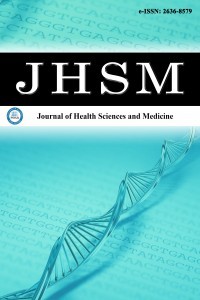
Journal of Health Sciences and Medicine
Yazarlar: ["Tülay OMMA", "Seda ÇOLAK", "Sevinç CAN SANDIKÇI", "Fatmanur Hümeyra ZENGİN", "Ahmet OMMA"]
Konular:-
DOI:10.32322/jhsm.1173363
Anahtar Kelimeler:Familial Mediterranean fever,Inflammation,Nutrition,Colchicine resistance,Dietary inflammatory index
Özet: Aim: Familial Mediterranean fever (FMF) is an autoinflammatory and genetic disease associated with chronic inflammation. Colchicine is the gold standard treatment for FMF, although some patients respond partially. Factors such as heavy exercise, cold exposure, stress, recent infection or surgery have been associated with the occurrence of attacks. Recently, nutrition is thought to be involved in the pathogenesis of autoimmune and autoinflammatory diseases. Therefore, we aimed to investigate the relationship between nutrition, inflammation and colchicine resistance by considering the nutritional status of FMF patients. Material and Method: The study included 59 patients and 67 healthy individuals who were matched for gender, age and body mass index (BMI). Clinical, anthropometric, and biochemical measurements were obtained. Three-days, 24-hour diet records were recorded in the nutrient database program (BeBiS software program), the amounts of macro and micronutrient contents were determined and the Diet Inflammatory Index (DII) score was calculated and compared between groups. Results: Statistically, the diets of FMF patients were found to be higher in omega-6, carbohydrate percentage and salt content, and lower in terms of lactose, fat percentage, monounsaturated fatty acids, retinol and biotin compared to controls. There was no correlation between DII and acute phase reactants and colchicine dose. Conclusion: The course of FMF can be affected by environmental factors, as well as its genetic background. Nutrition is a new and interesting topic in this regard and may contribute to inflammation and disease activity in FMF patients.